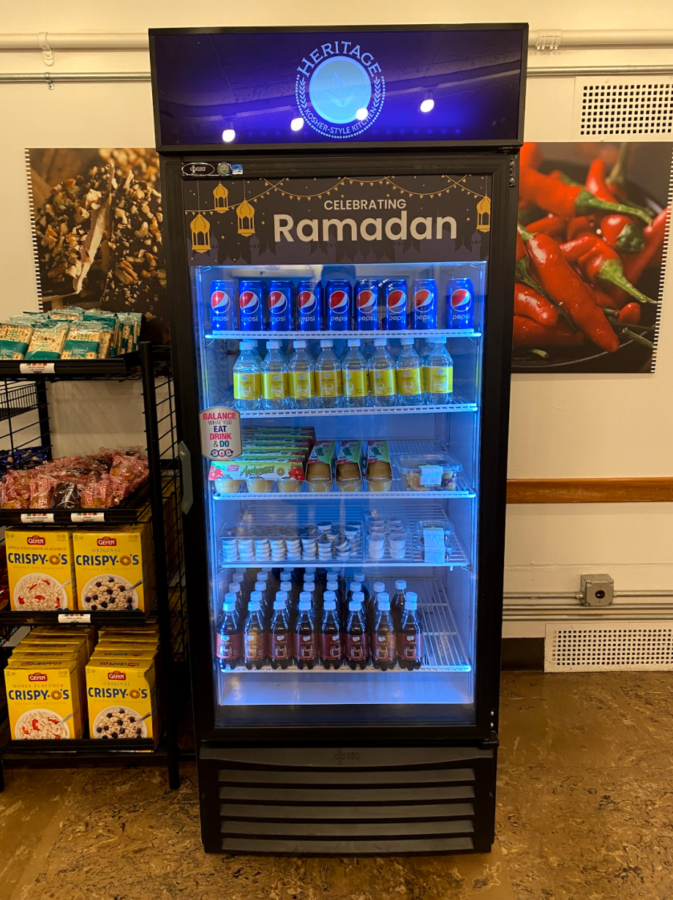AVI Expands Food Offerings for Students Observing Ramadan
This year, students observing Ramadan can pick up pre-sunrise meals from a special cooler in DeCafé.
AVI Foodsystems — which took over from the College’s previous partner, Bon Appétit, this year — has made several changes to ensure that students who are fasting during Ramadan have access to meals before sunrise and after sunset. While Campus Dining Services has always adjusted the meal plan for the month-long holiday, the new dining vendor has implemented more extensive changes to ensure students have access to food.
AVI has implemented a program where participating students can pick up predawn breakfast meals from DeCafé the night before and pick up a late dinner at extended dining hours from DeCafé. AVI has also gone a step further, bringing in their lead chef to prepare a hot predawn breakfast every Thursday morning by 4 a.m.
“The students are thrilled by this,” wrote Maysan Haydar, advisor for the Muslim Student Association, in an email to the Review. “It is a remarkably generous and thoughtful way to show support and have community when students may be feeling particularly lonely or homesick, as Ramadan is a time of gathering across the world.”
In Islam, Ramadan is a month of fasting from sunrise to sundown, which began on Monday and will last until May 12. During mealtimes before and after daylight, communities gather for shared food and spiritual reflection. Students on campus are often far away from their families and the community gatherings they grew up with. This year, COVID-19 safety guidelines make it even more difficult to hold gatherings on campus.
The Muslim Student Association has collaborated with Campus Dining Services to plan a Ramadan program for the past three years. Because the dates of Ramadan shift every year, it is challenging to set a definite program in place. Until recently, Ramadan has fallen in the summer, when there are no students on campus and no meal plan is necessary.
Haydar has acted as the bridge between dining services and students in recent years to integrate feedback and improve the program. Haydar has worked closely with AVI the past few months to plan this program and is pleased with the results.
“AVI has taken that same strategy [as last year] and turned it up to an 11, by seeking out recipes for familiar dishes that some of our international students would associate with Ramadan,” Haydar wrote. “They’ve similarly streamlined access to halal food by ensuring that any dish made with chicken on campus is known to Muslim students to be appropriate for their dietary needs.”
AVI has also contacted students to ask for home recipes to replicate at dining facilities, in addition to researching various regions’ cuisines and expanding halal meat options. Director of Student Life Auxiliaries and Special Projects Wayne Wood highlights that AVI is approaching this task with student needs in mind.
“AVI recognizes student feedback and [has] created menus with this input in mind,” Wood wrote in an email to the Review. “A student requested to have falafel among the hot breakfast offerings since it’s a custom in his country. As part of AVI’s overall strategy to embrace cultures and to give students a taste of home, this feedback has been [implemented].”
Lilkeisha Smith, director of operations at Oberlin College for AVI, says that she is committed to ensuring that students don’t have to worry about what to eat during these trying times.
Fasting is only one aspect of Ramadan. While Muslims gain appreciation for food and the energy it brings, the month is also dedicated to reflection and community. The comfort of community during this time can be difficult to create on campus, prompting many students to organize off-campus meals this month.
AVI is aware that the community aspect has been hampered by COVID-19 restrictions this year, and hopes to provide a room in Stevenson Dining Hall for students to come together and eat as a community in future years. Such a space would also be open to athletes and Conservatory students who have late practices and who would benefit from later mealtimes.
“Being able to come together to add to a program and be able to trade knowledge is a wonderful space to be in,” Smith said. “We cannot wait for the opportunity to do more post-pandemic.”







